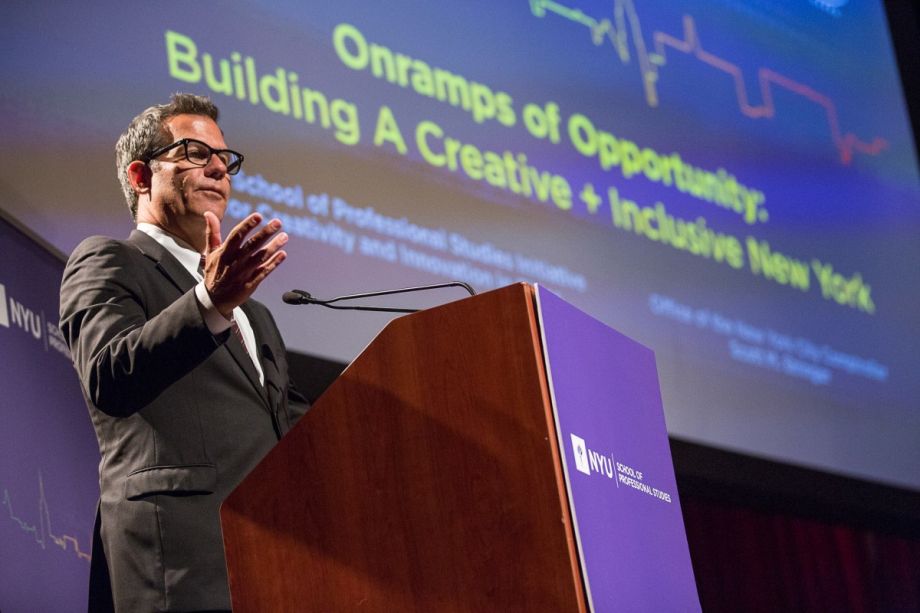New York is a creative-class poster child. Its design, tech and new media bonafides are the reason it receives the nation’s second-highest volume of venture capital after the Bay Area. But even its biggest boosters would concede that the city’s knowledge economy has mainly benefitted a handful of already-advantaged tribes and, perhaps, widened New York’s wealth gap. Consider this: In this alleged technology capital, three million residents have no internet access at home, and for every 11,000 public school students there is only one computer science teacher.
On Wednesday at New York University, at a discussion titled “Onramps of Opportunity: Building a Creative + Inclusive New York,” the preeminent voice of the knowledge economy, Richard Florida, tackled this disconnect with an announcement of a new certificate course, the Initiative for Creativity and Innovation in Cities at the NYU School of Professional Studies. The course will be geared toward city officials, non-profit leaders and economic development professionals, and is an attempt to spread the creative-class wealth to a broader segment of the city.
One class, called Tools and Techniques for Understanding Urban Economies, will teach attendees “how to effectively measure a community’s competitive assets, including growth industries, talent specializations and demographics, as well as the ability to promote and market those strengths to businesses.” Another class, Principles of Economic Development, pulls directly from the creative-class playbook, emphasizing “technology, talent, tolerance and territorial assets” as “the strategy for competitiveness in the creative age.” By marketing the course to city leaders and professionals from Staten Island to the Bronx, the aim is to take the economic-development strategies that have been associated with Manhattan and North Brooklyn’s boom, and bring them to parts of the city where that boom has never set foot.
“I thought we could build an educational model that wasn’t so cloistered and was very much broader based,” Florida told Next City, adding that his goal has been “to ‘preach the gospel of urbanism’ to a really broad group of people… This initiative is another mechanism for doing this.”
The course arrives at an interesting time for a city that’s now looking back with some skepticism at the prevailing wisdom of the Bloomberg era — which essentially held that the more expensive New York was, the better — and wondering if its new mayor, Bill de Blasio, who rode into office on a wave of middle-class angst, might be able to make the city a bit more welcoming to the 99 percent.
Florida thinks that expensive cities are only half the problem. It’s not just that cities are so pricey, he argues, it’s that the new army of blue-collar workers — the nannies, cable guys and Fresh Direct drivers — don’t stand a chance of climbing the ladder here. In other words, it’s not so much that the rent is too damn high, it’s that the pay is too damn low, and that the opportunities to grab a piece of creative-class juju don’t exist for many people. It’s interesting to think of urban affordability in these terms. It’s been so long since working-class jobs offered a clear path to prosperity that we’ve almost forgotten they once did. Whether Florida’s methods can actually blaze this path, however, is an open question. He himself has admitted that the knowledge economy has accelerated the very inequality that’s besieged the people he’s now reaching out to.
As such, most of Wednesday’s discussion revolved around the idea of inclusivity. “It’s not enough to build a knowledge economy,” said Florida. “We have to build a new American Dream around this urban revival.” By which he means, we need to resurrect the conditions that led to the post-war suburban boom, but retrofit them to work for those nannies and Fresh Direct drivers. That means unions, collective bargaining and a minimum wage that’s 50 to 60 percent of the local median income. It means giving everyone a legitimate shot at the jobs and opportunities that have fueled New York’s historic boom.
This is somewhat new territory for Florida, who comes from a working-class background in New Jersey, yet who rose to prominence over the last decade as a guru to the well-educated and upwardly mobile. He now thinks that back when he wrote The Rise of the Creative Class in 2003, he was too optimistic about the rising urban tide lifting all boats. “I think we looked at the urban future with rose-colored glasses,” he said. With this course, Florida is essentially embarking on an experiment to see whether his creative-class ethos can lift a city’s most disadvantaged neighborhoods, or whether its very premise requires a foundation of privilege to work.

Will Doig was formerly Next City’s international editor. He's worked as a columnist at Salon, an editor at The Daily Beast, a lecturer at the New School, and a communications staffer at the Open Society Foundations. He is the author of High-Speed Empire: Chinese Expansion and the Future of Southeast Asia, published by Columbia Global Reports.









